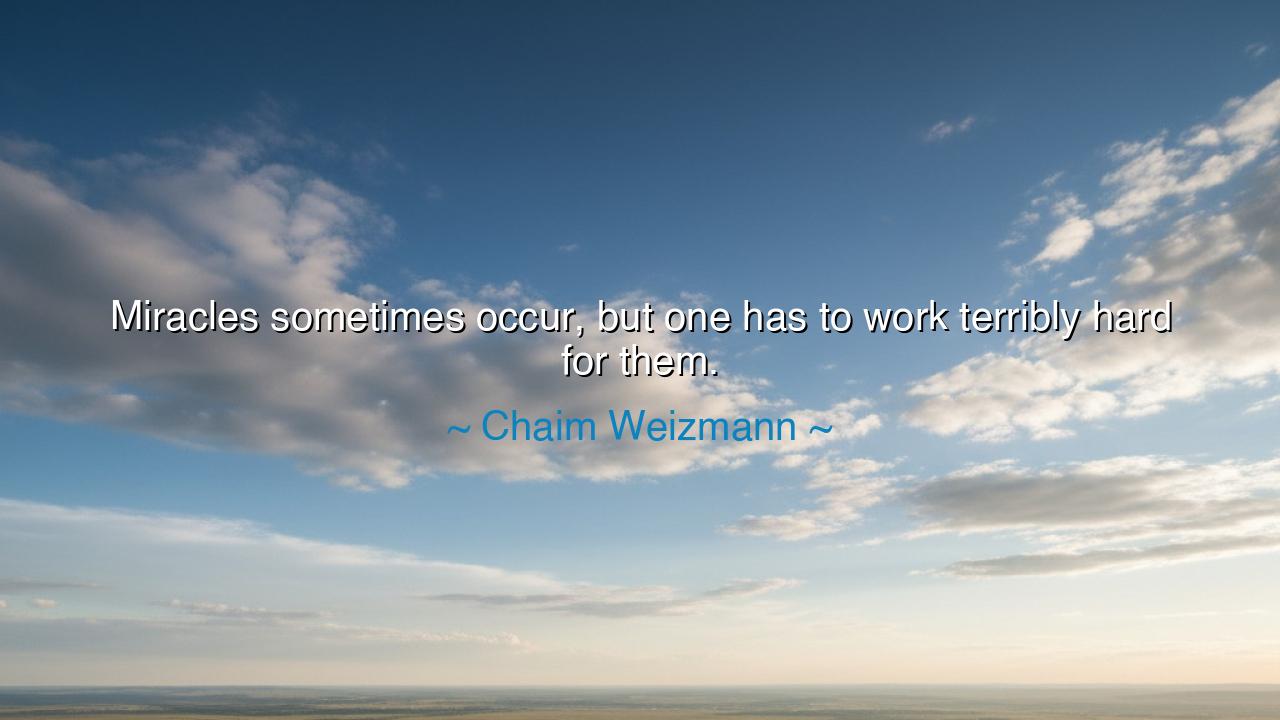
Miracles sometimes occur, but one has to work terribly hard for






When Chaim Weizmann declares, “Miracles sometimes occur, but one has to work terribly hard for them,” he speaks as one who has lived not in the clouds of idle hope but in the furnace of struggle. His words carry the wisdom that destiny does not fall into the lap of the slothful. The miracle, though touched by the divine, is not bestowed upon those who wait idly — it is granted to those who labor with unyielding will, carving space for wonder through sweat and perseverance.
The origin of this truth lies in Weizmann’s own life, as a scientist, statesman, and the first President of Israel. He saw a dream that seemed impossible: a nation reborn after centuries of exile. Many would call such a vision a miracle, yet Weizmann knew it could not bloom without relentless toil. Negotiations, sacrifices, and unbroken faith were the stones laid upon the path toward that vision. Thus his words remind us that what the world calls miraculous is often the fruit of unseen, grueling work.
To say that one must labor for a miracle is to unite heaven and earth in a single truth. The divine may open the door, but man must walk through it. The blessing descends, but only upon those who have prepared themselves with diligence and discipline. This teaching is as old as the prophets: that faith without work is barren, and that even the hand of God honors the effort of human striving.
In this way, Weizmann strips away the illusion that miracles are random gifts. They are rare, yes, but they often bloom in the fields most furrowed by human effort. It is the farmer who tills the soil through blisters and weariness who stands ready to receive the unexpected rain. It is the warrior who endures the long campaign who recognizes salvation when it arrives. Miracles come, but only to those who have readied themselves through labor.
Let the generations remember: hope alone is not enough. One must bind hope to work, faith to endurance, and prayer to sweat. Then, and only then, may the heavens send forth their wonders. Weizmann’s words endure as both encouragement and admonition — that the path to the extraordinary is carved by ordinary hands that refuse to cease their labor.






MHMy Hang
This quote makes me wonder—if miracles require hard work, does it mean that those who experience them have done something to deserve them? And if they happen, does it always mean we’ve worked hard enough? Is there ever a point where something just ‘happens’ without any effort? Where does sheer determination meet fate or coincidence in the process of making miracles happen?
NHNam Hoang
It’s intriguing to think that miracles aren’t just about waiting for the impossible to happen, but about working hard enough to make them a reality. But does this make miracles any less miraculous? If they require effort, do they lose their magical quality? I’d love to know your thoughts—can a miracle still be considered a miracle if it’s the result of consistent hard work?
CTPham Trinh Ca Thuong
The idea that miracles require hard work puts an interesting spin on the concept of serendipity. We usually think of miracles as something beyond our control, but this quote seems to suggest that our actions can influence the outcomes. Does this mean that with enough perseverance, we can turn our efforts into miracles? Or is there an element of chance involved that no amount of hard work can guarantee?
LLuna
I love this quote because it challenges the idea of passive hope. Weizmann makes a good point that miracles don't just fall into our laps—they require hard work. But, I wonder, can we sometimes work too hard, pushing ourselves beyond what’s healthy or sustainable in the name of chasing miracles? Where do we draw the line between persistence and burnout?
NLnguyen ly
Chaim Weizmann’s perspective suggests that miracles aren't just about waiting for something extraordinary to happen, but putting in the work to create the circumstances for them. But what if we work hard and still don't see the results we expect? Can we still call it a miracle if the outcome is uncertain? What’s the balance between striving for greatness and accepting that some things are out of our control?